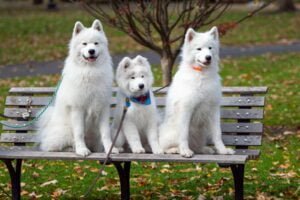
As a dog owner, understanding and applying the principles of dog socialization is crucial in raising a well-rounded, confident, and happy pet. Proper socialization of your dog effectively helps prevent behavioral issues in adult dogs, including aggression and fearfulness. Socializing your puppy should be considered equally important to dog training. Here is a comprehensive puppy socialization checklist to ensure that your furry friend grows up to be sociable and adaptable in various environments.
Does Socialization Matter?
In my 20s, I adopted a Chow-Chow Shepherd mix in the middle of summer in TX and waited for the weather to cool before properly socializing him. As a result, he was great with the family but way too protective with visitors. It was a huge mistake that took years of effort to overcome.
When I adopted my first purebred dog, I lived in a large apartment complex with many families. Socialization with children was a huge priority and I worked with the children (and a lot of treats) to make the experience positive for them and for my dog. As a result, that dog was the best canine ambassador ever. So many parents told me they were always afraid of dogs until they met him.
Proper socialization can make the difference between a dog that is a joy and a dog that is a burden.
Begin with Puppy Socialization Classes
Puppy socialization classes are a wonderful starting point in introducing your puppy to a range of experiences, noises, and creatures. These puppy classes are specially curated to meet the delicate needs of puppies who are still in the critical phases of development and the controlled environment offers a safer socialization option than dog parks. They’re not just for new pet parents; even seasoned dog owners can benefit from the structured socialization opportunities these classes offer.
Dog Socialization Classes for Various Ages
Not just puppies, adult dogs, and especially unsocialized ones, can benefit immensely from dog socialization classes. If you’re wondering how to socialize a reactive dog or an adult dog that hasn’t had much exposure, these classes could be your answer. They provide a controlled environment where your dog can learn, interact, and gradually build confidence.
How to Socialize a Dog: Beyond Formal Classes
Remember, socialization isn’t restricted to formal settings. Daily life offers innumerable opportunities for puppy social experiences – be it meeting a new person, encountering other animals, or merely exposing the puppy to new environments and sounds.
How to Use Our Dog Socialization Checklist
- Go Slow – You don’t need to cover the whole list in a day. In fact, it is better if you don’t. It is better to socialize your puppy in increments of 10-15 minutes than to try and cram in an hour or more of activity. Remember, your dog is adapting to a new environment, and these new experiences can be overwhelming.
- Start Soon – Some people want to wait until their pet is fully vaccinated before introducing their dog to others. To be frank, this is too long. Improper socialization is one of the leading reasons dogs are surrendered to shelters. The prime window of puppy socialization is around 8-14 weeks. You should spend extra time socializing your dog at 10 to 12 weeks of age. This does not mean you should invite people for a party the day after you get your new puppy. Pay attention to the 3-3-3 Rule.
- Prioritize the List – Think about your priorities and your environment. Will there be young children in your environment? Get ahead of that early. Do you have people over to play music? Make sure the puppy is comfortable with musical instruments before you are jamming out to some Van Talen. In general, you want to expose your puppy to positive experiences for the most common triggers in your neighborhood.
- It Takes More than One Exposure – The list is set up so you can run through each socialization element five times. It takes more than one positive experience for the dog to build a positive association that will last.
- Keep Going – Dogs go through different stages of maturity. You may find experiences that need socialization. Keep working on it throughout your dog’s life for a long-lasting and satisfying relationship.
Customizing Your Puppy Socialization Checklist
Create a checklist tailored to your pet, ensuring that it includes a variety of experiences. These could range from vet visits, car rides, exposure to different kinds of people and animals, and various public places. For a reactive or unsocialized dog, the approach should be more careful, ensuring that the experiences are more controlled and not overly stressful.
Adult Dogs and the Unsocialized
Socializing your adult dog is important too. When dealing with an adult or unsocialized dog, the process may require more patience and strategy. The key is gradual exposure and ensuring the experiences are positive and not overwhelming. If you’re dealing with a reactive dog, considering professional assistance to help guide the socialization process might be beneficial. It is very important that you create a safe environment for interactions with other dogs and people.
Download the Good Dog Dad Dog Socialization Checklist
Further Reading
Every dog is unique, and the approach to their socialization should be as well. Ensuring a wide array of positive experiences, particularly during their formative puppy months, is essential in nurturing a well-adjusted and happy dog. Check out our Dog Socialization FAQ for answers to the most common puppy socialization questions.
